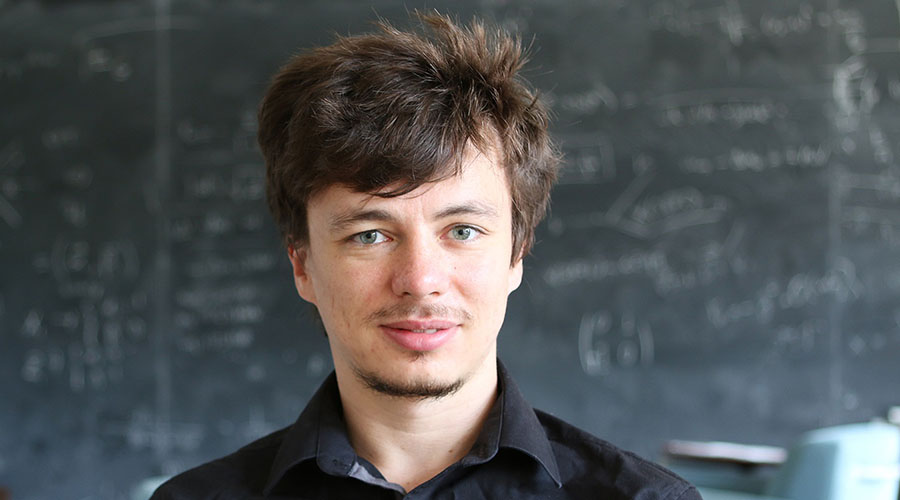
November 2023 (Volume 32, Number 11)
Theoretical Physicist Awarded Valley Prize for Work on Quantum Gravity
Geoffrey Penington’s groundbreaking work as a graduate student has helped kickstart advancements in quantum information.
By Kendra Redmond

Credit: Lee Sandberg / Institute for Advanced Study
Geoff Penington
Geoffrey Penington first encountered theoretical physics as a kid, through the pages of Brian Greene’s The Elegant Universe. Captivated by the questions it explored, Penington remembers thinking how cool it would be to work on those subjects. But he never thought he would. "I always thought I’d end up doing something else, but it was nice to imagine," he says.
Now, in recognition of his groundbreaking work on quantum gravity, APS has awarded Penington the 2024 APS George E. Valley, Jr. Prize. The prize is given annually to an early-career individual who has made an outstanding scientific contribution deemed likely to have a dramatic impact on the field.
Although Penington didn’t think he’d become a theoretical physicist, he decided to follow his interest as long as it was fun and he had a job. That led him to Patrick Hayden's quantum information science group at Stanford University. While a graduate student there, Penington distinguished himself by applying new insight to the infamous black hole information paradox.
In the 1970s, Stephen Hawking applied quantum mechanics to black holes and realized that an isolated black hole will radiate energy and then evaporate, says Penington. While that’s not unexpected, "the really weird thing about Hawking’s calculation is that it seems to suggest that the radiation that escapes has nothing to do with the mass of the black hole and, in particular, has nothing to do with the matter than formed the black hole in the first place," Penington says. "If you looked at the final state of the radiation, you couldn't reverse engineer the initial state of matter."
This paradox puzzled theorists for decades. No one could point to an error or missing factor in Hawking’s calculation. Still, the idea that the final state of a system doesn’t in any way depend on its initial state was inconsistent "with every other law of physics that we know," says Penington.
Eventually most scientists conceded that information about the black hole had to be preserved, even if the mechanism was unknown. Then, in 2019, two independent papers went up on arXiv on the same day — a single-author paper by Penington and one by Ahmed Almheiri et al. — that brought some resolution.
The papers, published later in the Journal of High Energy Physics, presented a more complete version of Hawking’s calculation and a result consistent with information being preserved. In a follow-up paper about six months later, Penington demonstrated that such information could be preserved through a spacetime wormhole. These papers formed the basis for his PhD thesis and ongoing research as an assistant professor at the University of California, Berkeley.
Theoretical work seems to come naturally to Penington, but he’s not one to stare at a blank piece of paper. "Ideas come out of lots of conversations with people at blackboards," he says. "Just you explaining things to them and them explaining things to you."
He also finds that letting ideas percolate in his subconscious pays off — although not always at opportune moments. When he got the idea that led to his first pivotal paper, Penington realized that if the idea worked, it would really work. He tried not to be too preoccupied during a subsequent month-long vacation with friends but was only partly successful. "This was by far the most interesting thing I’d ever thought about," he says.
What captivates Penington about theoretical physics is what he calls the simple, obvious idea. "We have two theories that describe nature, and there must, at some level, be one theory," he says. Finding a set of self-consistent rules, a basic algorithm of the universe, would be a milestone for humanity, he says.
Experimental results — from, say, smashing together particles at the Planck scale — might speed up the process, but step one is to identify a consistent, complete theory that we understand mathematically, Penington says. "Getting to that, even if it isn’t the right one, would still be a breakthrough."
To get there, Penington says theorists will need to be bolder than ever. "The traditional story is that just adding quantum mechanics and gravity together doesn't really work very well, except for in very simple things, and that we need to go to some fancy idea — string theory or something like that — to make sense of it all. And in the last ten years, we just keep being surprised by how much gravity knows," he says. At some point we’ll need those fancy ideas, but "I think that’s got to wait around while we’re using just gravity to learn more," he says.
In the meantime, Penington is keeping a close eye on quantum cosmology. Anytime there is progress on black holes, he wonders what it can reveal about the Big Bang or cosmological horizons. In the next ten years, "possibly the most exciting thing that could happen would be some real insight into how to think about quantum gravity and cosmology," he says.
When he’s not talking to colleagues at a blackboard or in the office, Penington is usually on an outdoor adventure — rock climbing, skiing, hiking, or windsurfing. “Doing physics and really getting into wilderness have a similar appeal,” he says. “It's the feeling of connection to nature, but also the feeling of exploration, and the feeling of not knowing what you're going to find. There’s something deeply exciting about that.”
Kendra Redmond is a writer based in Minnesota.
©1995 - 2024, AMERICAN PHYSICAL SOCIETY
APS encourages the redistribution of the materials included in this newspaper provided that attribution to the source is noted and the materials are not truncated or changed.
Editor: Taryn MacKinney
November 2023 (Volume 32, Number 11)
Articles in this Issue
